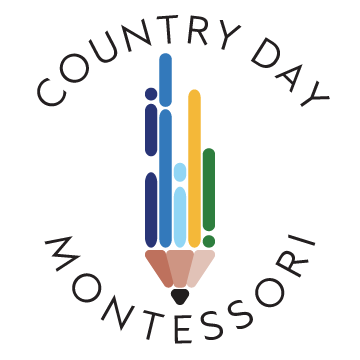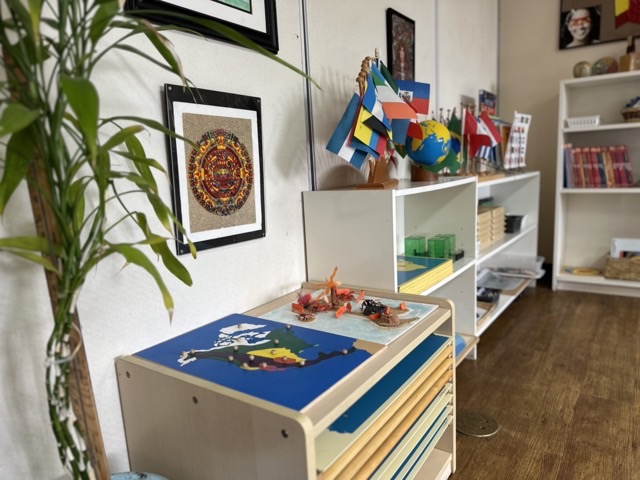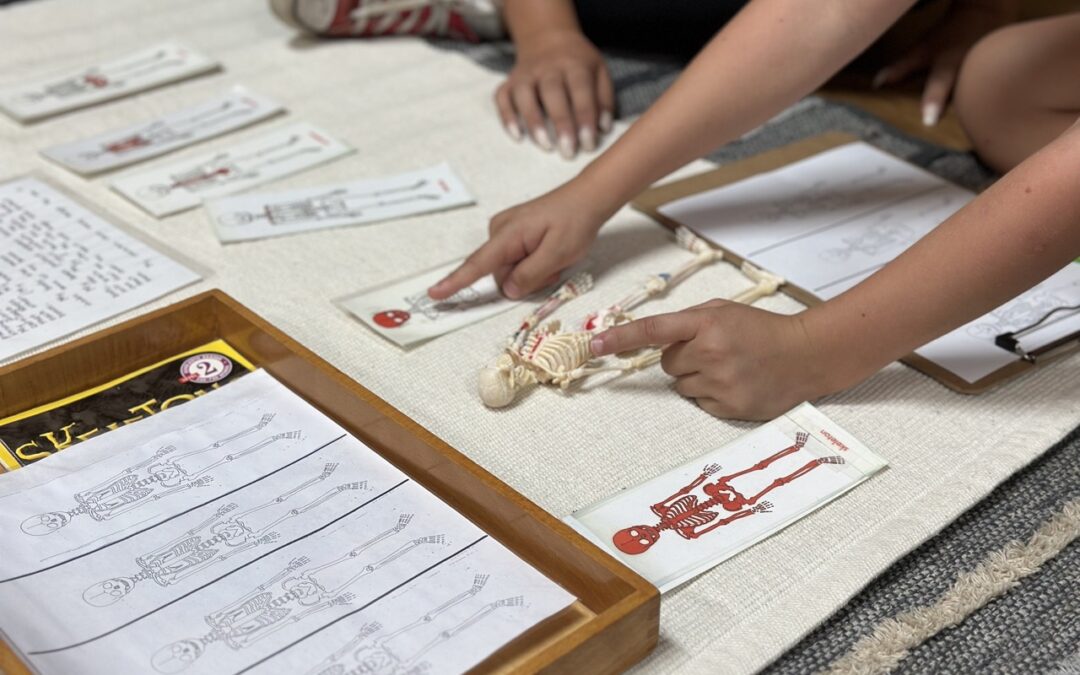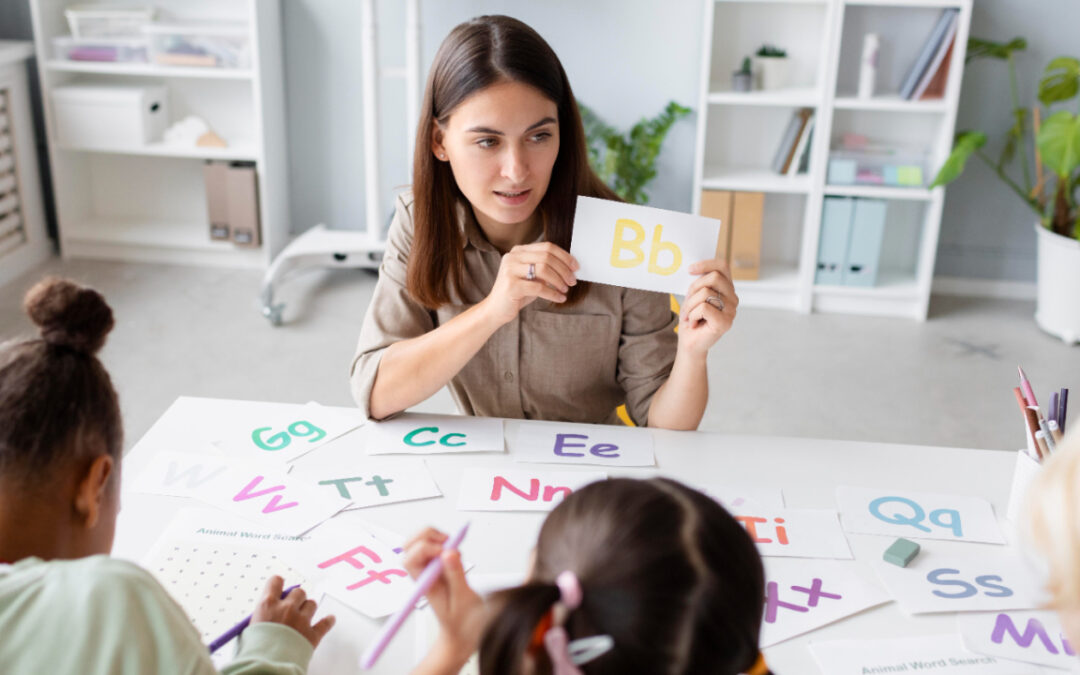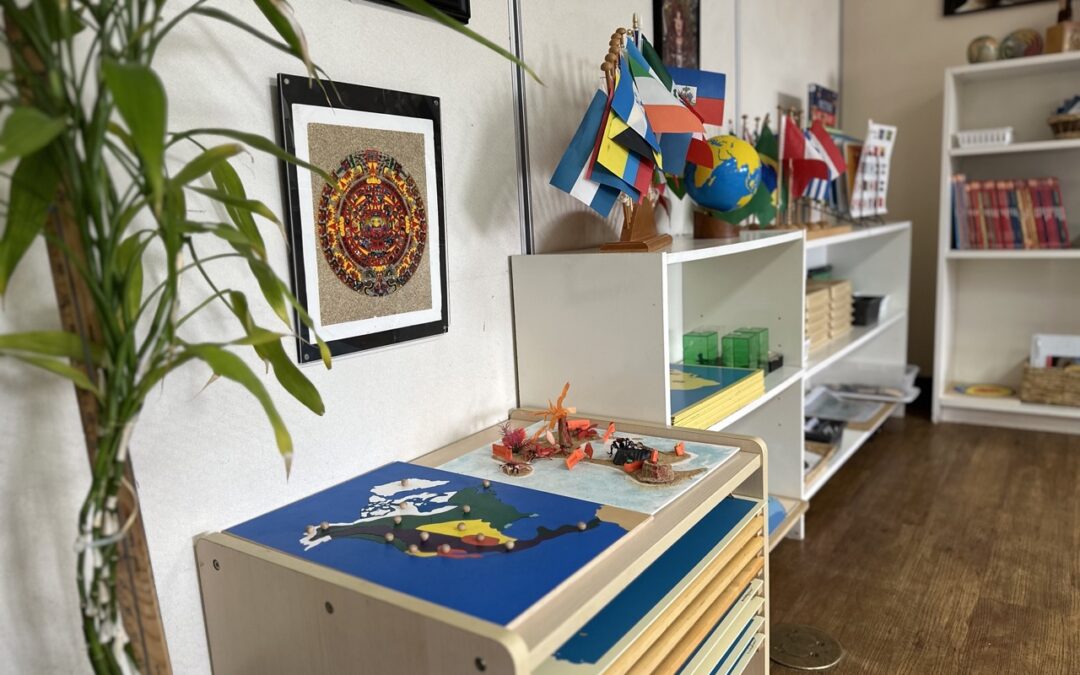In San Antonio, some Montessori daycare programs (like ours) welcome children as young as 6 weeks old into their school. But what is Montessori Daycare and how is it different from a more traditional establishment?
This guide will walk you through the philosophy, educational methods, and what to expect when choosing a Montessori daycare, helping you make an informed decision for your child’s early education.
Understanding the First Plane Development (Infancy to Six Years)
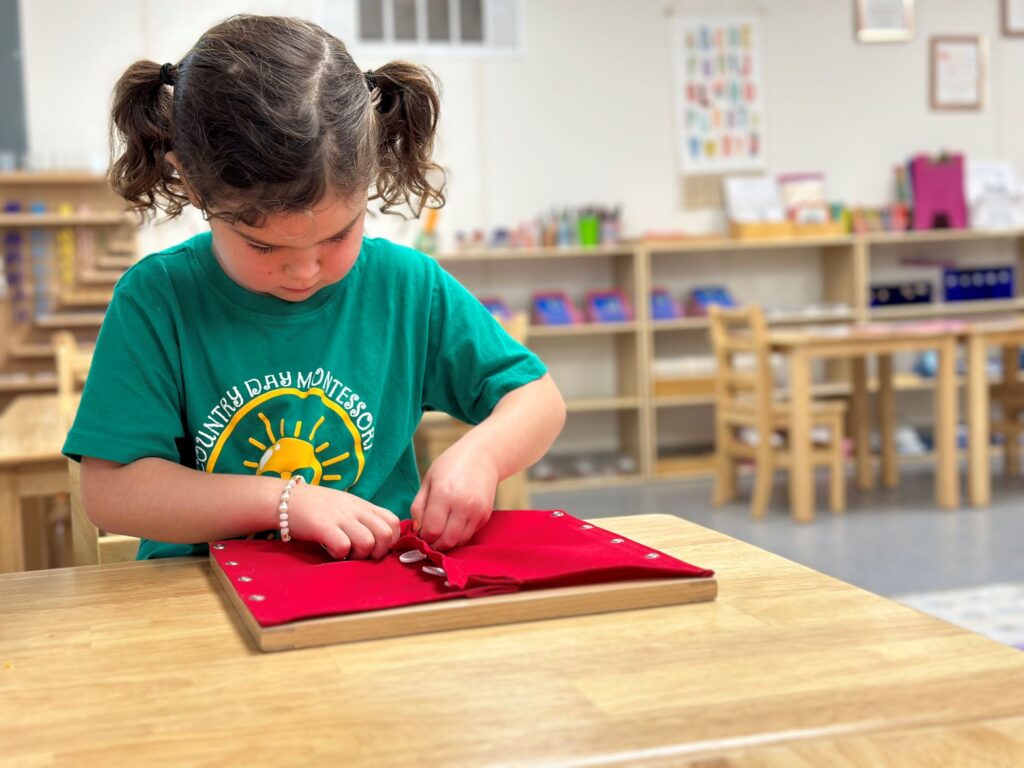
The first six years of a child’s life are a critical time for brain growth and learning. During these years, children have what Maria Montessori called “the absorbent mind,” where they easily take in information from their surroundings without effort.
In the early phase, from birth to age three, children learn by absorbing information without thinking about it. Skills like walking, talking, and basic motor control are picked up naturally through watching and copying others. During this time, their brains are developing rapidly, forming about one million new connections every second.
Between ages three and six, children begin to learn more intentionally. They start paying attention to details, sorting information they’ve already absorbed, and making independent choices. This is when they explore their environment more actively and build confidence in decision-making.
Key facts about early brain development:
- By age five, about 90% of the brain’s core structure is developed.
- The brain grows quickly during this time and is highly sensitive to experiences.
- Sensory learning—using sight, touch, taste, smell, and hearing—plays a key role in shaping brain pathways.
A child’s environment is crucial during these early years. Children absorb more than just words—they take in social behaviors, cultural norms, and emotional cues. These experiences shape their personality and how they learn later in life.
So how does a Montessori program take advantage of these ‘absorbent years’ to give your child the best start they can get?
Montessori programs like at Country Day provide the right environment and guidance to help children develop into confident, capable, and curious learners. In fact, setting up the right environment allows each child to develop their skills at their own pace, following an important philosophy of Montessori learning.
The Philosophy of Montessori Daycare
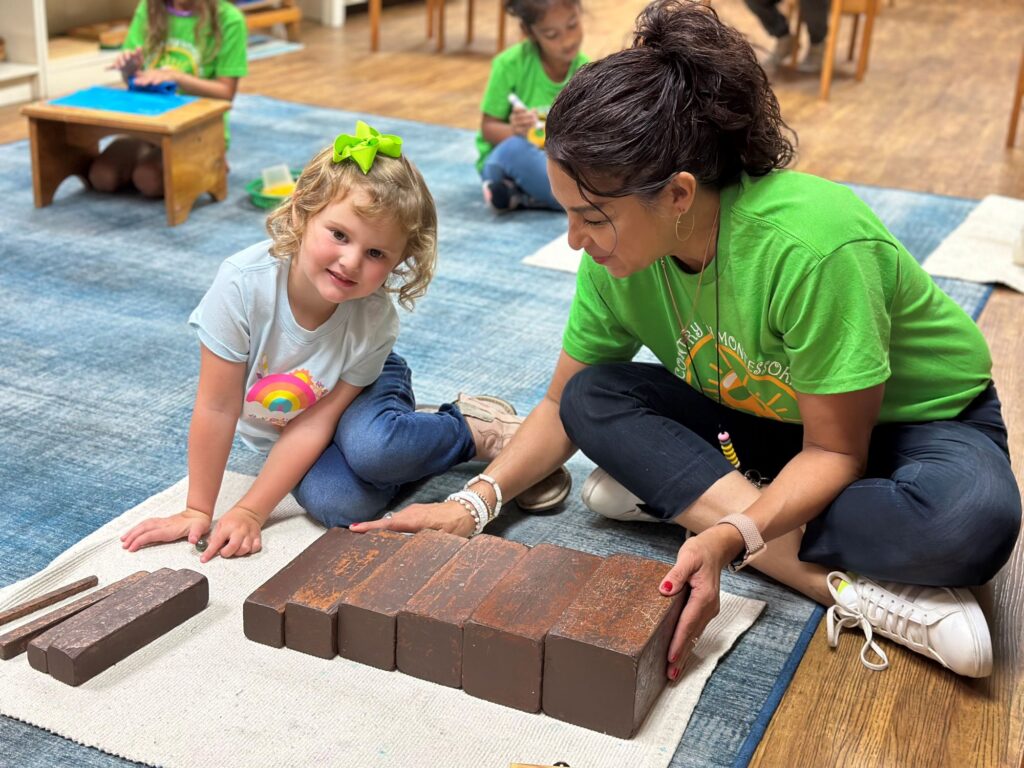
Child-Centered Learning
Montessori daycare is focused on developing essential learning tools—physical, social, and emotional skills that help children learn and grow. All exercises are introduced on a gradient scale as the child develops. ‘Work’ for a 2 or 3 year old includes pouring and transferring exercises, cleaning, and dressing activities with buttons and zippers help strengthen their hands and bodies, preparing them to use tools like pencils, paintbrushes, scissors, and glue later on with ease.
Babies are introduced to different textures, sounds, and are gently guided to socialize and learn to play, crawl, and stand.
With gentle guidance from a Montessori teacher, toddlers also learn to explore new spaces, care for their materials, make choices, and respect others. These experiences help them understand feelings, make decisions, and interact well with friends.
The Montessori approach has been scientifically validated to foster critical thinking, independence, creativity, and a love of learning through numerous research studies.
Prepared Environment
A Montessori environment is one of the key differentiators of this education style. Classrooms are designed intentionally to be child-sized. This includes furniture, low open shelves, and clear pathways to allow toddlers to move freely and access materials on their own. The program also avoids cheap plastic toys and toys with bright flashing lights and sounds. Natural materials like wood create a calm atmosphere that supports focus.
Developmentally Focused Spaces
Each area of the classroom serves a purpose:
- Practical Life: Pouring, cleaning, and self-care activities build independence.
- Reading Corner: Accessible books encourage early literacy.
- Art Area: Tools for drawing and crafts support creativity and fine motor skills.
- Movement Area: Space for physical activities supports gross motor development.
Organization and Learning Tools
Materials are carefully chosen and rotated to keep toddlers engaged without overwhelming them. Each item has a designated place, promoting order, memory, and independence. Self-correcting materials allow learning through trial and error, fostering confidence and problem-solving skills.
Balance of Safety and Independence
The space is childproofed yet offers appropriate challenges. Step stools, child-sized cleaning tools, and accessible bathroom facilities empower toddlers to care for themselves and their surroundings, building competence and self-confidence.
Calm and Focused Atmosphere
Natural lighting, neutral colors, and minimal clutter reduce sensory overload, helping toddlers focus. Natural materials, plants, and outdoor spaces further connect children with nature and create a peaceful learning environment.
Supporting Whole-Child Development
The prepared environment bridges home and the wider world, supporting physical, social, emotional, and cognitive growth while encouraging independence and self-discovery.
Key Areas of Study of Montessori Daycare
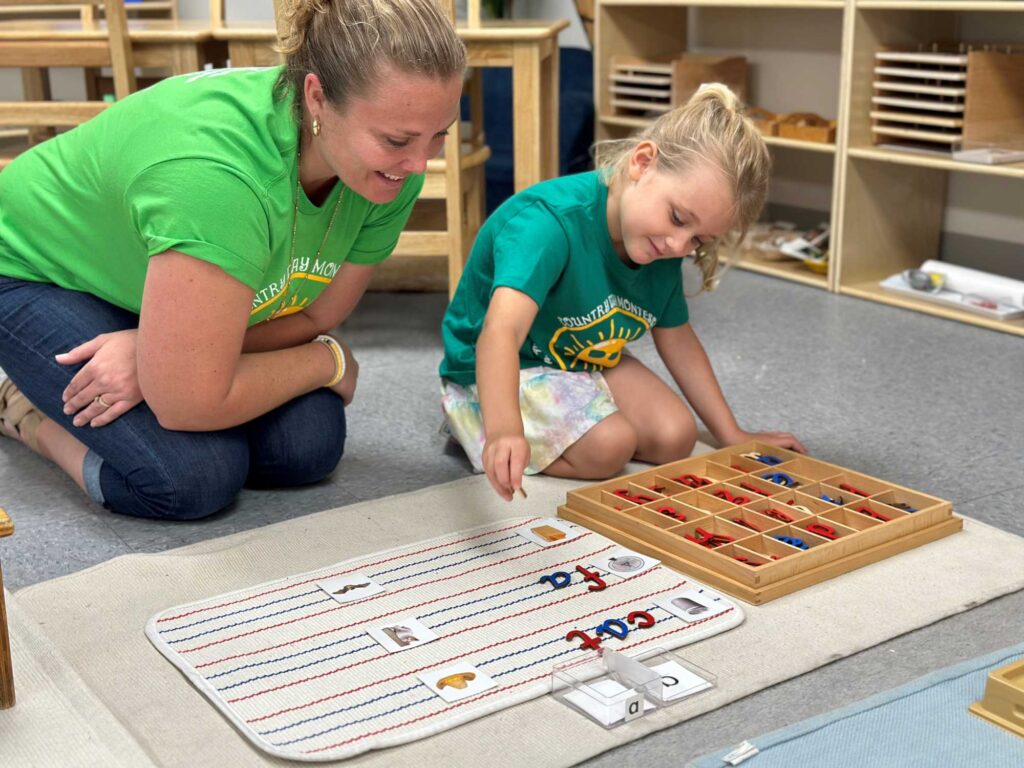
Practical Life Skills
Toddlers practice real-life tasks like pouring, spooning, setting tables, and cleaning. These activities build fine motor skills, focus, independence, and responsibility while helping them care for their space and contribute to their community.
Sensory Exploration
Children explore the world using their senses. They work with materials that teach differences in texture, weight, color, and sound, helping them understand and organize the world around them.
Mathematical Foundations
Early math concepts develop through hands-on play. Activities like counting, sorting, and matching help toddlers explore numbers, sizes, and patterns while sparking curiosity.
Language Development
Language grows through songs, stories, and conversations. Children expand their vocabulary by naming objects, exploring books, and participating in group discussions, which also build early reading skills.
Cultural and Scientific Discovery
Toddlers learn about the world through maps, nature, science, and culture. Activities like gardening, observing the weather, assembling maps, and caring for animals introduce basic science, while music, art, and global customs build cultural awareness.
Creative Expression
Art and music are part of daily life. Toddlers explore painting, drawing, and sculpting while also enjoying singing, dancing, and experimenting with instruments, encouraging creativity and self-expression.
Physical Development
Movement activities like climbing, balancing, pouring, and threading support both large and small motor skills. These activities improve coordination, balance, and hand control.
Practical Skills and Independence
Daily routines include dressing, bathroom use, and managing personal items. These self-care tasks build confidence, independence, and a sense of capability.
Educational Tools and Curriculum
Hands-On Learning Materials
The Montessori classroom features meticulously designed materials that serve specific educational purposes and promote learning through exploration and discovery. Each material is self-correcting, allowing children to independently assess their understanding and adjust their approach without direct adult intervention. The classroom includes:
Core Materials
The carefully prepared environment contains materials that develop fine motor skills, concentration, and independence, including:
- Sensorial materials designed to refine the five senses—touch, sight, smell, taste, and hearing
- Pink Tower and geometric solids for understanding three-dimensional size and mathematical concepts
- Sandpaper letters and Moveable Alphabet for language development
- Golden Beads and bead chains for understanding the decimal system and mathematical operations
See the Difference for Your Baby or Toddler – Schedule a Personalized Tour Today!
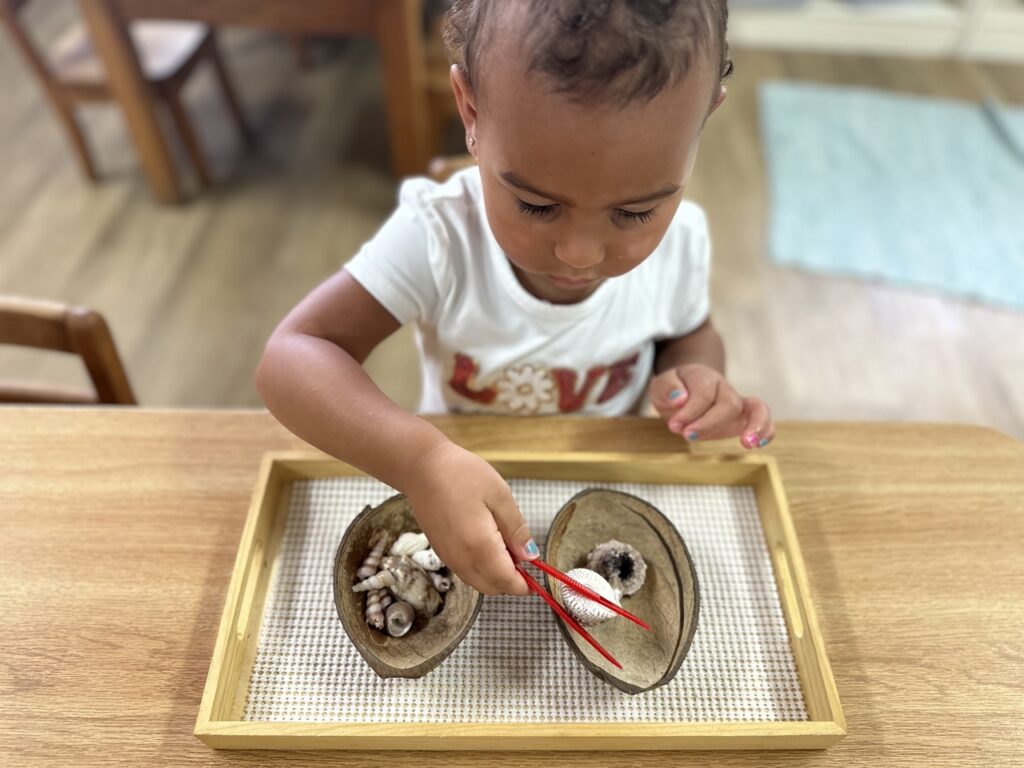
Experience the unique learning environment at Country Day Montessori, where children grow through hands-on learning and independence. Our 4.5-acre campus features barnyard animals, a butterfly greenhouse, and authentic Montessori classrooms for children from infancy to elementary. Some of our students came from Kirby near Friendship Park.
With small group instruction and personalized learning plans, we inspire curiosity and a love of learning. Meet our caring teachers and see our classrooms at 4194 Jung Rd, San Antonio, TX 78247. Book a tour today and discover the Country Day difference!
Frequently Asked Questions
How do mixed-age classrooms function in a Montessori setting?
Montessori classrooms group children in three-year age spans (0-3, 3-6, 6-9, 9-12), creating a natural learning community. Older children become mentors and role models, while younger ones learn through observation. This arrangement allows children to develop at their own pace without competition, fostering leadership skills in older students and providing younger ones with peer learning opportunities. The three-year cycle enables children to build strong relationships with teachers and classmates.
What role does the prepared environment play in Montessori education?
The prepared environment is meticulously designed to support independent learning and exploration. It features child-sized furniture, accessible materials, and a clear sense of order. The environment follows six key principles: freedom of movement and choice, structure and order, beauty, nature and reality, social interaction, and intellectual development. Materials are arranged from simple to complex and concrete to abstract, allowing children to progress naturally through their learning journey and foster cognitive development.
How do uninterrupted work periods benefit children in Montessori schools?
Uninterrupted work periods, typically lasting 2-3 hours, are fundamental to Montessori education. During these periods, children choose their activities and work at their own pace without interruption. This extended time allows them to develop deep concentration, master skills through repetition, and experience the satisfaction of completing challenging work. Research shows that children are most likely to choose challenging work and concentrate deeply during the last hour of these periods.
What makes a Montessori teacher different from a traditional teacher?
Montessori teachers function as guides rather than traditional instructors. They observe children carefully, prepare the environment, and provide individualized guidance when needed. Unlike traditional teachers who lead whole-class lessons, Montessori teachers work with students individually or in small groups, respecting each child's unique learning pace and interests. They focus on fostering independence and avoiding interrupting children's concentration, allowing natural learning to occur.
